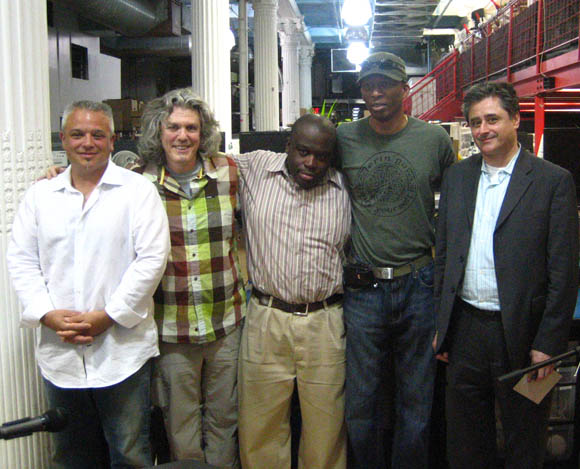
Odds are, you’ve had this discussion over drinks one evening, but some major names gathered in New York last night to look at the big picture: just what does the future of the music industry hold? Electronic musician Jason Kramer (see his cellphone interface for music software and homemade Ableton Live controller) was there, and offers this guest writeup for CDM:
“The Impact of New Technologies”
Well… the Future of Music panel discussion was awesome! The night was kick-started by author and entertainment lawyer Steve Gordon giving his lecture on the impact of new technologies on music and the music business. He described the current status of the music biz; largely the loss of over $5 billion in the last 10 years. Gordon went on to speak about some new opportunities for independent artists including how for only a few hundred dollars and the touch of a key you get your album world wide, where as before independent artists were limited to much, much smaller means of distribution.
The rest of the discussion was moderated by expert hip-hop activist, media assassin, and journalist Harry Allen, who doled out the topics to the rest of the panel, which included:
Bob Power: Grammy Award winning producer/writer/recordist/mixer for many amazing artists incl. Erykah Badu, Miles Davis, KRS 1, De La Soul, A Tribe Called Quest, The Roots, etc….
Hank Shocklee: producer/composer/record label exec to Public Enemy, Ice Cube, Madonna, Mary J. Blige, etc….
Nick Sansano: engineer/producer of Public Enemy, Run DMC, Jon Spencer Blues Explosion, etc….
“Transfer of Power”
— As in, from record labels to the indy artists and eventually the public. It was argued that although there is this transfer of power, the capital and capabilities of the labels has not been transferred. The avenues for exposure, promotion and distribution that they have at their disposal are unmatched. Shocklee questioned what the “transfer of power” actually meant and said cooperation and trust are paramount in rebuilding the relationship between the public and record labels.
“You Can Make a Great Record”
Allen then dropped the old ‘what do you think about all the studios closing’ bomb. Citing the recent reality that the real estate and gear studios own is worth more these days than the recordings they produce. Interestingly enough Power claims it doesn’t matter, but what does matter is the big picture, if it sounds good or not and how to go forward from there. But wait, are we at the same debate that comes along every time a new media is invented, i.e. records/tapes/CD’s? Things are changing, technology is influencing art but there’s really no need to worry because digital didn’t get rid of analog, MIDI didn’t get rid of performance and synths didn’t get rid acoustic instruments so what’s different about digital music? Some people cringe when they think of the compression that is applied to their songs when they’re converted to MP3, but a good sounding mix will make a good sounding MP3. The public and audiences will always be there and they want good music, but the thing is now that they want cheap music. We need to find new ways of showcasing our music and unfortunately although independent artists have this power to record an album and make it available worldwide they just don’t have the means to get it to the public on a large scale. No publicity, promotion or tour = small bucks. These major labels are like banks and without their massive reservoir of dollars for A&R, artist development and such there just won’t be any superstars anymore.
“Rock & Roll was Built by People Doing Something Wrong”
The last debate of the night was aimed straight at the future, keeping new ideas in mind. There was a lot of big catch phrases being thrown around like “create a demand”, “start a buzz” and “gettting more creative”. Since the attention span of the audience has changed in the last few years the tactics for promotion must be reevaluated as well. New revenues are replacing old revenues. We have a lot of exciting opportunities right now and to get in on the ground floor of a new idea could potentially be very promising. Take it one night at a time, collaborate, be more honest, educate yourself about the recording process, practice arranging, write your own contracts, and get good at promoting yourself and maybe you’ll catch a marlin out there.
The night was magnanimously hosted by New York City’s own Tekserve.
Anyone else at the event with comments, please join in! -Ed.